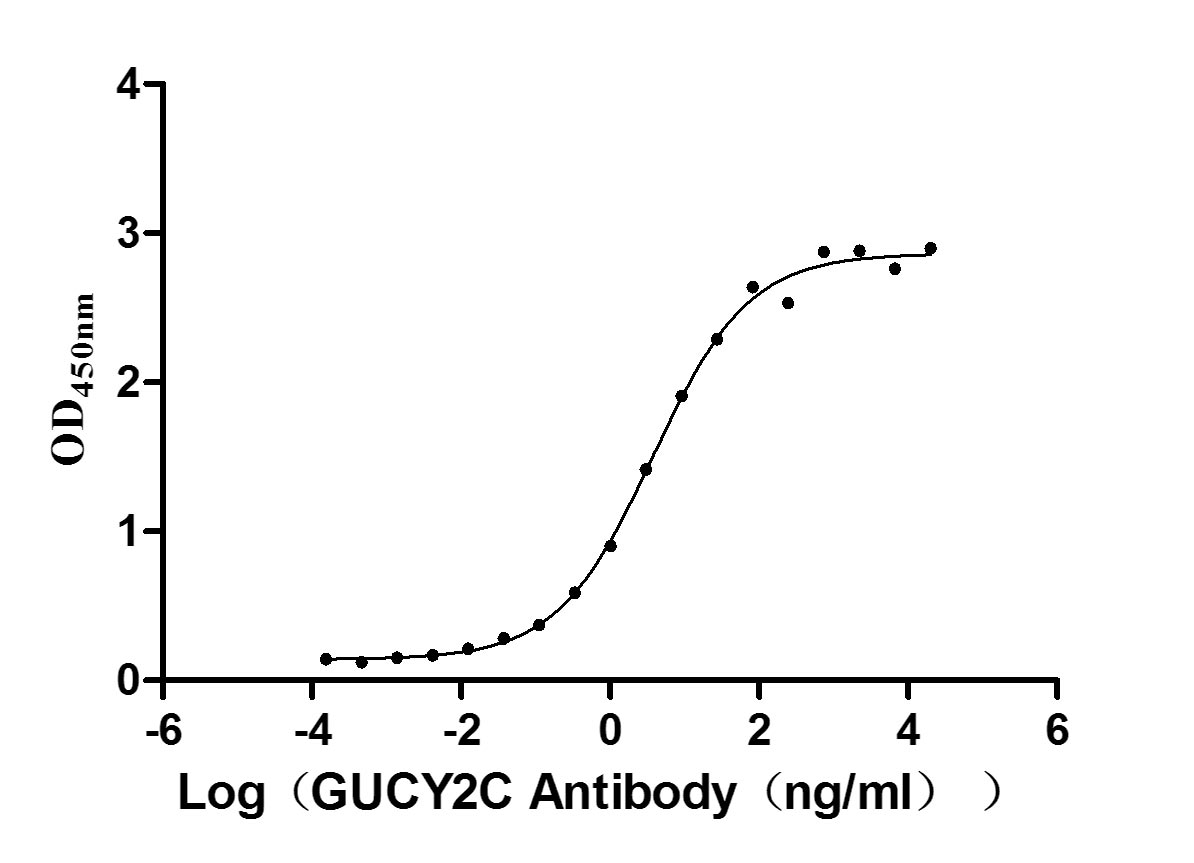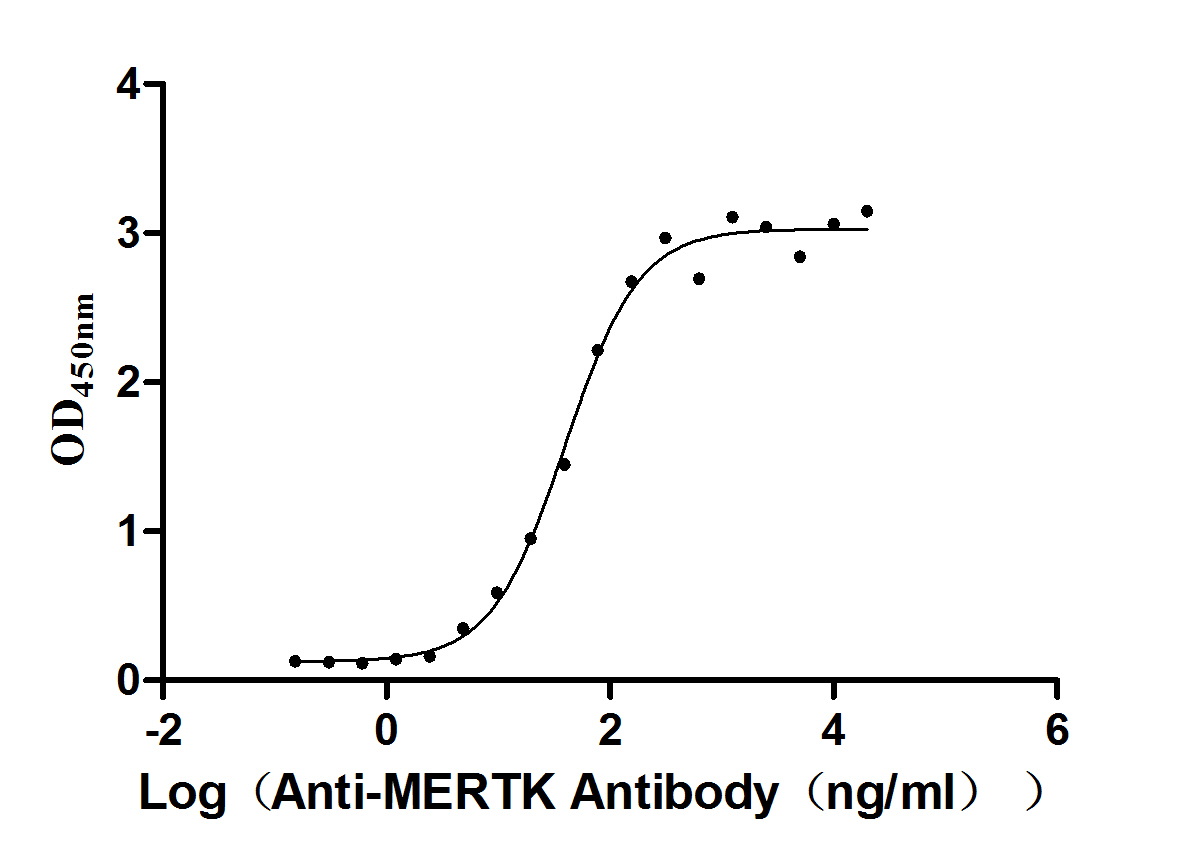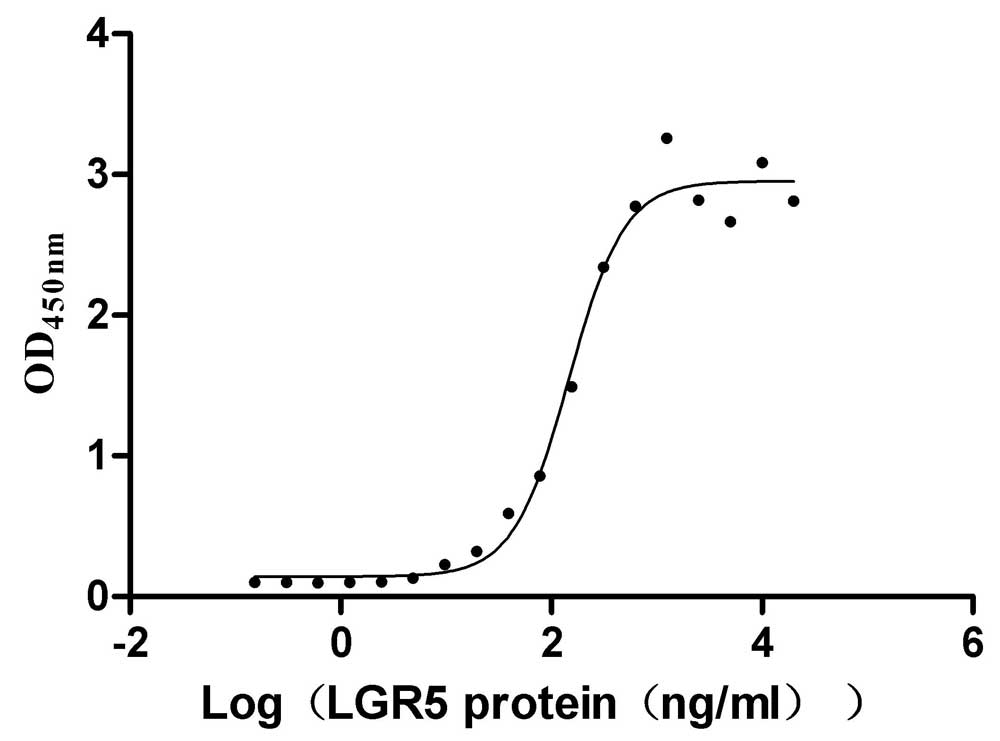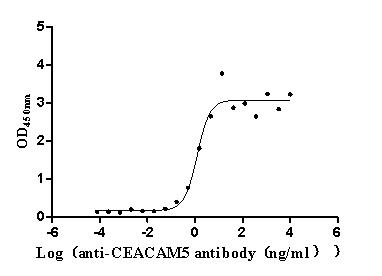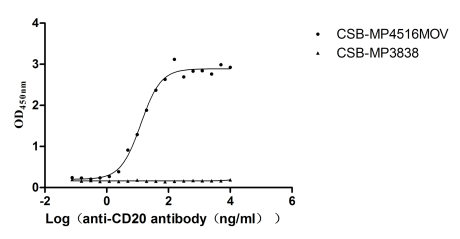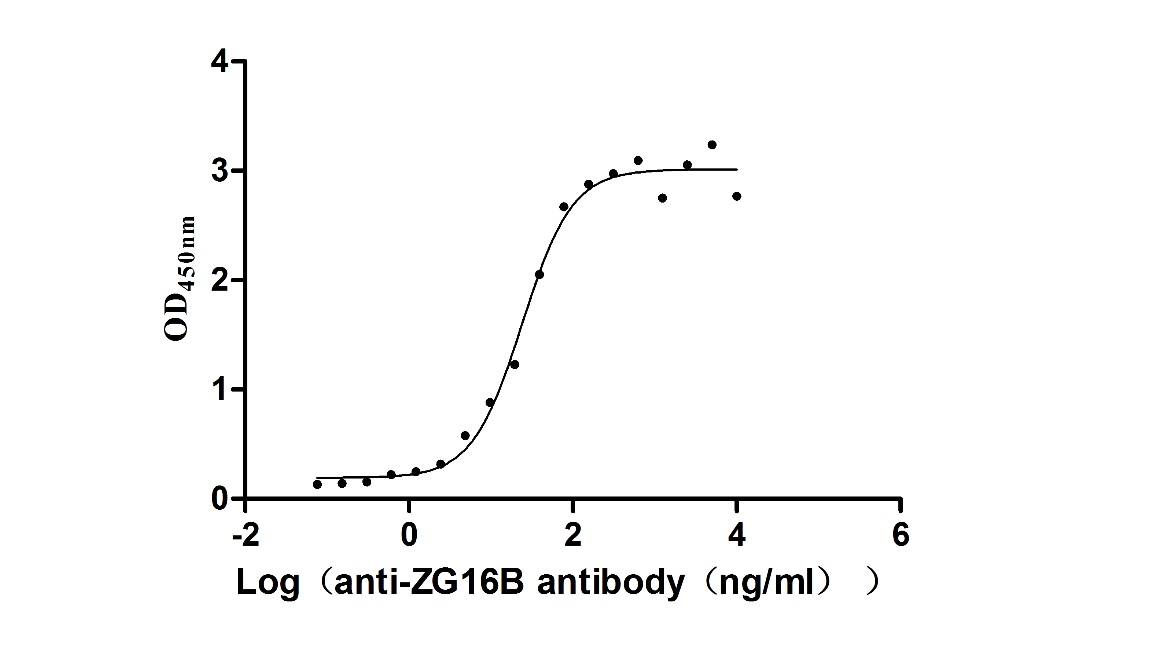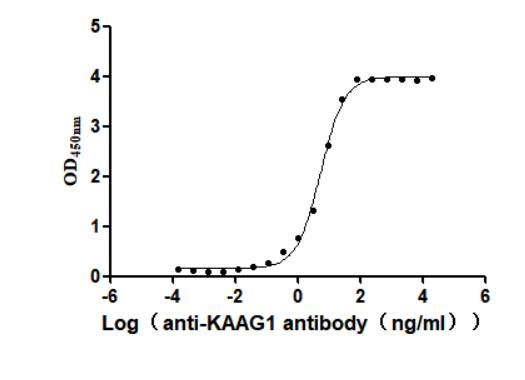Recombinant Rat Mitochondrial brown fat uncoupling protein 1 (Ucp1)
-
货号:CSB-CF025554RA
-
规格:
-
来源:in vitro E.coli expression system
-
其他:
产品详情
-
基因名:
-
Uniprot No.:
-
别名:Ucp1; Slc25a7; Ucp; Mitochondrial brown fat uncoupling protein 1; UCP 1; Solute carrier family 25 member 7; Thermogenin
-
种属:Rattus norvegicus (Rat)
-
蛋白长度:Full Length of Mature Protein
-
表达区域:2-307
-
氨基酸序列VSSTTSEVQPTMGVKIFSAGVSACLADIITFPLDTAKVRLQIQGEGQASSTIRYKGVLGT ITTLAKTEGLPKLYSGLPAGIQRQISFASLRIGLYDTVQEYFSSGRETPASLGSKISAGL MTGGVAVFIGQPTEVVKVRMQAQSHLHGIKPRYTGTYNAYRVIATTESLSTLWKGTTPNL MRNVIINCTELVTYDLMKGALVNHHILADDVPCHLLSALVAGFCTTLLASPVDVVKTRFI NSLPGQYPSVPSCAMTMYTKEGPAAFFKGFAPSFLRLGSWNVIMFVCFEQLKKELMKSRQ TVDCTT
Note: The complete sequence including tag sequence, target protein sequence and linker sequence could be provided upon request. -
蛋白标签:N-terminal 10xHis-tagged
-
产品提供形式:Liquid or Lyophilized powder
Note: We will preferentially ship the format that we have in stock, however, if you have any special requirement for the format, please remark your requirement when placing the order, we will prepare according to your demand. -
缓冲液:Lyophilized from Tris/PBS-based buffer, 6% Trehalose, pH 8.0
-
储存条件:Store at -20°C/-80°C upon receipt, aliquoting is necessary for mutiple use. Avoid repeated freeze-thaw cycles.
-
保质期:The shelf life is related to many factors, storage state, buffer ingredients, storage temperature and the stability of the protein itself.
Generally, the shelf life of liquid form is 6 months at -20°C/-80°C. The shelf life of lyophilized form is 12 months at -20°C/-80°C. -
货期:Basically, we can dispatch the products out in 1-3 working days after receiving your orders. Delivery time may differ from different purchasing way or location, please kindly consult your local distributors for specific delivery time.Note: All of our proteins are default shipped with normal blue ice packs, if you request to ship with dry ice, please communicate with us in advance and extra fees will be charged.
-
注意事项:Repeated freezing and thawing is not recommended. Store working aliquots at 4°C for up to one week.
-
Datasheet & COA:Please contact us to get it.
相关产品
靶点详情
-
功能:Mitochondrial protein responsible for thermogenic respiration, a specialized capacity of brown adipose tissue and beige fat that participates in non-shivering adaptive thermogenesis to temperature and diet variations and more generally to the regulation of energy balance. Functions as a long-chain fatty acid/LCFA and proton symporter, simultaneously transporting one LCFA and one proton through the inner mitochondrial membrane. However, LCFAs remaining associated with the transporter via their hydrophobic tails, it results in an apparent transport of protons activated by LCFAs. Thereby, dissipates the mitochondrial proton gradient and converts the energy of substrate oxydation into heat instead of ATP. Regulates the production of reactive oxygen species/ROS by mitochondria.
-
基因功能参考文献:
- The expression of peroxisome proliferator-activated receptor gamma coactivator 1alpha (PGC-1alpha) and uncoupling protein (UCP)-1 in brown adipocytes. PMID: 27686967
- e found that CPT1AM-expressing rBA have increased FAO, lipolysis, UCP1 protein levels and mitochondrial activity. Additionally, enhanced FAO reduced the palmitate-induced increase in triglyceride content and the expression of obese and inflammatory markers. Thus, CPT1AM-expressing rBA had enhanced fat-burning capacity and improved lipid-induced derangements. PMID: 27438137
- The history of discovery of UCP1, the mitochondrial uncoupling protein of brown adipocyte, has been described. (Review) PMID: 27916641
- In the absence of regulators (fatty acids, retinoids), rodent UCP1 presents a high ohmic proton conductance that cannot be detected in human UCP1. PMID: 27750036
- Data indicate that prolonged cold exposure may induce anti-inflammatory response in mesenteric white adipose tissue associated with induction of UCP-1 expression. PMID: 27560796
- results suggest that modulation of serotonin system results in positive modulation of UCP and mitochondrial bioenergetics in brown fat tissue. PMID: 26129910
- Data suggest that expression of Ucp1 in brown adipose tissue (BAT) of fetal/neonatal pups is regulated by maternal dietary factors; here, maternal low-protein diet up-regulates expression of Ucp1 and reduces birth weight of obesity-prone male pups. PMID: 25858881
- Vitamin D deficiency decreases adiposity in rats and causes altered expression of uncoupling proteins and steroid receptor coactivator3 PMID: 25132457
- An ERRgamma inverse agonist reduces UCP1 expression in brown adipocytes. PMID: 23404793
- there is a role for ubiquitinylation and the cytosolic proteasome in turnover of mitochondrial UCP1. PMID: 22531154
- Data suggest that interscapular brown adipose tissue plays important role in burn injury-induced hypermetabolism through its morphological changes and expression of Ucp1. PMID: 23169784
- Endurance training blocked the high-sugar diet induced up-regulation of UCP1 expression in interscapular brown adipose tissue, whereas it up-regulated the expression of Ucp3 mRNA in muscle. PMID: 23084644
- Fatty acids and nucleotides compete to regulate the activity of UCP1. PMID: 22952235
- Production of UCP1 a membrane protein from the inner mitochondrial membrane using the cell free expression system in the presence of a fluorinated surfactant. PMID: 22226924
- We observed that stressed rats increased the expression of UCP-1 in the mitochondria and PPAR-gamma. PMID: 20948513
- the mammalian thermogenic mitochondrial protein; found in brown adipocytes PMID: 11748291
- Superoxide activates mitochondrial uncoupling proteins PMID: 11780125
- energy metabolism and expression of uncoupling protein 1 in brown adipose tissue after 21 days of recovery from intracerebroventricular mouse leptin in rats PMID: 12062312
- UCP1 muscle gene transfer is associated with an induced mitochondrial proton leak, which could contribute to increase energy expenditure. PMID: 12127082
- High levels are expresssed in muscle of transgenic mice and selective affect muscles at rest and decreases their IIb fiber content PMID: 12221093
- Data show that rosiglitazone or retinoid treatment activates p38 MAP kinase, which is involved in uncoupling protein-1 (UCP-1) gene expression in fetal rat brown adipocytes. PMID: 12414803
- Substitutional mutations in the uncoupling protein-specific sequences of UCP1 revealed amino acid residues of the first alpha-helix UCP signature may be required to hold the intact UCP1 transport conformation PMID: 12479871
- Effects of dietary protein content on uncoupling proteins (UCP) 1, 2 and 3 expression in various tissues of Zucker lean and obese rats were studied PMID: 12603007
- Model where the nucleotide binds deep inside the bundle core. The purine ring interacts with the matrix loops while the polyphosphate chain is stabilized through interactions with essential Arg residues. PMID: 12678439
- Results suggest that ventromedial hypothalamic lesions enhance expression of uncoupling proteins 1, 2, and 3 in brown adipose tissue under long-term fasting through an increase in peroxisome proliferator-activated receptor-gamma activity. PMID: 12706490
- study of isolation, refolding, transport properties, and regulation of recombinant UCP1 PMID: 12734183
- Independent caudal brainstem Mc3r/Mc4r trigger for sympathetically stimulated elevation in brown adipose tissue UCP-1 gene expression. Melanotan-II induced rise in UCP-1 expression can be mediated by caudal brainstem and spinal cord. PMID: 12960080
- UCP1 expression was significantly increased in repeated immobilized group. UCP1 gene expression significantly increased, and acute immobilization induced further increase. PMID: 14529581
- results suggest that the inhibition of leptin secretion during lactation is involved in the down-regulation of uncoupling protein 1 and 3 expression in brown adipose tissue and skeletal muscle PMID: 14605003
- Alpha-helices are the major component of UCP1 secondary structure. PN-binding mechanism does not involve significant secondary-structure rearrangement. UCP1 shares similar secondary-structure characteristics with the ADP/ATP carrier. PMID: 14766012
- Infusion of histamine into the third cerebral ventricle of rats increased the activity of sympathetic nerves and UCP1 mRNA expression in brown adipose tissue. PMID: 15099666
- Transgenic mice expressing rat UCP1 show low UCP1 activity under normoxia but is induced during ischemia-reperfusion. The presence of UCP1 mitigates reperfusion-induced damage, probably because it lowers mitochondrial hyperpolarization at reperfusion. PMID: 15262832
- has the capacity to regulate metabolic flux and production of reactive oxygen-containing molecules in the thymus. PMID: 15695816
- UCP-1, Mc4R and CART gene expression are increased as an immediate consequence of consuming high energy diet, and may be involved in countering hypercaloric intake. PMID: 15720470
- The decline in leptin is consistent with the hyperphagic response, and we conclude that one of the mediators of elevated metabolism during prolonged REM-SD is increased gene expression of UCP1 in BAT. PMID: 15727948
- Upregulated by rosiglitazone. PMID: 15887043
- UCP1 content in rat brown fat is notably affected by changed thyroid status. PMID: 15891081
- This result indicates that fucoxanthin upregulates the expression of UCP1 in WAT, which may contribute to reducing WAT weight. PMID: 15896707
- the mechanism of action of UCP 1 is to filp long-chain fatty acid anions PMID: 16291746
- reactive alkenals activate the proton conductance of UCP1 more strongly when fatty acids are also added, with implications for both mechanistic and physiological models of UCP1 activation PMID: 16451125
- Protein chimeras where different regions of the second repeat of UCP1 have been sequentially replaced with their UCP2 counterparts were generated. These chimeras present a progressive degradation of the characteristic bioenergetic properties of UCP1. PMID: 16814247
- These data suggested that TUSC5 is involved in the differentiation, and its expression is regulated independently of the beta-adrenergic pathway in BAT. PMID: 17592729
- These findings suggest that mitochondrial UCPs could play both a neuro-protective role against oxidative damage and a thermal signaling role for neuro-modulation in vestibular nerve. PMID: 17686539
- Benidipine up-regulates not only UCP1 gene expression in BAT but also UCP3 gene expression in BAT and gastrocnemius muscle, which may contribute to thermogenesis in rats. PMID: 17878603
- The changes observed in BAT suggest that IL-15 could be implicated in lipid consumption in this tissue by regulating lipid oxidation and probably thermogenesis, processes mediated by UCP1 and UCP3 and PPARdelta and PPARalpha. PMID: 18239634
- UCP 1 is present in rat and mouse thymocytes and the antibody to full-length UCP 1 is not specific for UCP 1. PMID: 18471433
- UCP1 mRNA expression is upregulated by tea catechins, and the suppressive effect of catechins on body fat is associated with UCP1 expression in brown fat. PMID: 18479902
- Data demonstrate that, in pancreatic beta-cells, UCP1/2 have no uncoupling activity in the basal state or after fatty acid stimulation. PMID: 18626658
- UCP-2 is the only isoform detectable in the kidney and UCP-2 protein can be detected in proximal tubular cells and cells of the medullary thick ascending loop of Henle PMID: 19227473
- demonstrate that activation of UCP1 leads to a purine nucleotide-sensitive decrease in the ubiquinone redox state. PMID: 19747168
显示更多
收起更多
-
亚细胞定位:Mitochondrion inner membrane; Multi-pass membrane protein.
-
蛋白家族:Mitochondrial carrier (TC 2.A.29) family
-
组织特异性:Brown adipose tissue.
-
数据库链接:
KEGG: rno:24860
STRING: 10116.ENSRNOP00000004900
UniGene: Rn.10281
Most popular with customers
-
Recombinant Human Heat-stable enterotoxin receptor (GUCY2C), partial (Active)
Express system: Mammalian cell
Species: Homo sapiens (Human)
-
Recombinant Human Tyrosine-protein kinase Mer (MERTK), partial (Active)
Express system: Mammalian cell
Species: Homo sapiens (Human)
-
Recombinant Human R-spondin-1 (RSPO1), partial (Active)
Express system: Mammalian cell
Species: Homo sapiens (Human)
-
Express system: Mammalian cell
Species: Homo sapiens (Human)
-
Recombinant Macaca fascicularis Membrane spanning 4-domains A1 (MS4A1)-VLPs (Active)
Express system: Mammalian cell
Species: Macaca fascicularis (Crab-eating macaque) (Cynomolgus monkey)
-
Recombinant Macaca fascicularis zymogen granule protein 16 homolog B (ZG16B) (Active)
Express system: Mammalian cell
Species: Macaca fascicularis (Crab-eating macaque) (Cynomolgus monkey)
-
Recombinant Human Kidney-associated antigen 1(KAAG1) (Active)
Express system: Baculovirus
Species: Homo sapiens (Human)


